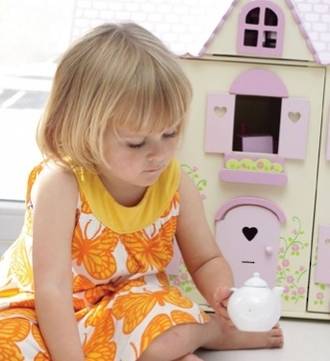Shop
01858
https://www.under5s.co.nz/shop/Hot+Topics+Articles/Toys+Books+Play/Benefits+of+play/Why+do+kids+have+imaginary+friends.html
Why do kids have imaginary friends?
|
There’s evidence that children's imaginary friends are more widespread than ever. Find out why it’s normal, how make believe can affect a child’s development, adjusting to your child’s new friend, when should you be worried and how long will their imaginary friend be around for.
|
You might also be interested in ...
Moving your toddler to their first big bed
Moving from a cot to their new big bed is a milestone in your toddler’s life. Some are excited about the transition, whilst others find it all a bit daunting. Make moving to their first big bed easy for your toddler with these simple tips.
Helping pre-schoolers cope with loss & grief
Sadly it’s a fact that many preschoolers will be exposed to some form of loss and grief in their early years. Whether it’s when a pet or someone close dies, if their parents separate or a good friend moves away. Toddlers and preschoolers don’t really understand how the world works, so how do we explain loss and grief to them?
join usJoin us on social media for all our latest news. |
sign upSign up and receive our latest newsletters. |
|







Making up and chatting to imaginary friends goes hand in hand with your kids growing imagination and interest in pretend play.
Why do kids have imaginary friends?
Toddlers and preschoolers love being with people and if there’s no one around, they’ll invent a special friend of their own.
1. Is it normal for kids to have imaginary friends?
Imaginary friends are a normal part of many kids development, but as a parent it can sometimes be hard to get your head around!
Rather than being an outdated phenomenon, imaginary friends seem more common these days. This is possibly down to us having a more accurate understanding of the way that kids play than in the past and the fact that we now talk quite openly about imaginary friends.
For most of the 20th century and before, the prevailing attitude was that imaginary playmates were a sign of insecurity and latent neurosis. People were less inclined to admit to having imaginary friends.
Smaller family units are also more common these days and kids are now more likely to play by themselves, which creates an environment that is welcoming to imaginary friends.
Research carried out by the Max Planck Child Study Centre in the UK, found that half of the kids they interviewed had imaginary friends and were indeed first or only children. However, making up friends is not necessarily an indicator of loneliness.
A recent study by the University of Washington also discovered that two thirds of children have an imaginary friend at some stage of their childhood.
Fictional friends give kids an outlet for exploring the world, including things that may be new to them or even upsetting.
For instance, if someone in your child's life is sick or is involved in an accident, they might pretend their imaginary friend has the same experience too. Because they can control the outcome, having an imaginary friend survive the incident can be reassuring.
2. How can an imaginary friend affect kids development?
Imaginary friends can help to improve your child’s language skills and increase their confidence. It’s another form of communication.
Plus it shows that they can imagine and discuss a character and have a sense of the perspective and understand the emotions of another person.
Having an imaginary friend has a positive effect on your child's development.
3. Adjusting to your kids imaginary friend
There are many ways to let your kids imaginary friend be a positive part of their childhood.
For instance:
4. When should you be worried about an imaginary friend?
While imaginary friends are good for helping your kids communicate in most cases, there may be underlying reasons why they have been quiet and withdrawn lately.
If you’ve got concerns, encourage them to tell you all about how they’re feeling and tell you more about how their friend is feeling too.
It might be that they are struggling to make friends at kindy or they are being bullied at preschool, and so their imaginary friend is their way of dealing with it.
Although it’s rarely necessary, if there is anything you find particularly troubling you should contact your GP and discuss your concerns.
5. How long will your kids imagery friend stay?
While your kids pretend friend won’t be around forever (lots of kids report that their friend has moved away or even died when they’ve finished with them), other invisible friends may replace them over the next few years until they grow out of them.
More kids articles to enjoy
- Helping toddlers make friends
- Learning to share
- The plus side of play dates
Image source: nymetroparents.com